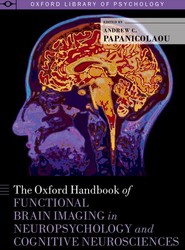(To see other currencies, click on price)
MORE ABOUT THIS BOOK
Main description:
4E cognition (embodied, embedded, enactive, and extended) is a relatively young and thriving field of interdisciplinary research. It assumes that cognition is shaped and structured by dynamic interactions between the brain, body, and both the physical and social environments.
With essays from leading scholars and researchers, The Oxford Handbook of 4E Cognition investigates this recent paradigm. It addresses the central issues of embodied cognition by focusing on recent trends, such as Bayesian inference and predictive coding, and presenting new insights, such as the development of false belief understanding.
The Oxford Handbook of 4E Cognition also introduces new theoretical paradigms for understanding emotion and conceptualizing the interactions between cognition, language, and culture. With an entire section dedicated to the application of 4E cognition in disciplines such as psychiatry and robotics, and critical notes aimed at stimulating discussion, this Oxford handbook is the definitive guide to 4E cognition.
Aimed at neuroscientists, psychologists, psychiatrists, and philosophers, The Oxford Handbook of 4E Cognition will be essential reading for anyone with an interest in this young and thriving field.
Contents:
Part I: Introduction
1: Albert Newen, Shaun Gallagher, and Leon de Bruin: Introduction: 4E Cognition: Historical Roots, Key Concepts, and Central Issues
Part II: What is Cognition?
2: Julian Kiverstein: Extended Cognition
3: Erik Rietveld, Damiaan Denys, And Maarten Van Westen: Ecological-Enactive Cognition as Engaging with a Field of Relevant Affordances: The Skilled Intentionality Framework (SIF)
4: Ezequiel Di Paolo: The Enactive Conception of Life
5: Daniel D. Hutto and Erik Myin: Going Radical
6: Ken Aizawa: Critical Note: So, What Again is 4E Cognition?
Part III: Modelling and Experimentation
7: Jakob Hohwy: The Predictive Processing Hypothesis
8: Maurice Lamb and Anthony Chemero: Interacting in the Open: Where Dynamical Systems Become Extended and Embodied
9: Tom Froese: Searching for the Conditions of Genuine Intersubjectivity: From Agent-based Models to Perceptual Crossing Experiments
10: Richard Menary: Cognitive Integration: How Culture Transforms Us and Extends our Cognitive Capabilities
11: Tobias Schlicht: Critical Note: Cognitive Systems and the Dynamics of Representing-in-the-world
Part IV: Cognition, Action, and Perception
12: Michael D. Kirchhoff: The Body in Action: Predictive Processing and the Embodiment Thesis
13: Deborah Tollefsen and Rick Dale: Joint Action and Ecognition
14: Matthew Ratcliffe: Perception, Exploration, and the Primacy of Touch
15: Joel Krueger: Direct Social Perception
16: Sven Walter: Critical Note: Bodily Experience, Action and Perception from the 4e Perspective
Part V: Brain-Body-Environment Coupling and Its Perception
17: Mark Rowlands: Disclosing the World: Intentionality and 4e Cognition
18: Shaun Gallagher: Building a Stronger Concept of Embodiment
19: Elisabeth Pacherie: Motor Intentionality
20: Frederique De Vignemont: The Extended Body Hypothesis: Referred Sensations from Tools to Peripersonal Space
21: Arne M. Weber and Gottfried Vosgerau: Critical Note: Brain-body-environment Couplings: What do they Teach us about Cognition?
Part VI: Social Cognition
22: Vittorio Gallese and Corrado Sinigaglia: Embodied Resonance
23: Vasudevi Reddy: Why Engagement? A Second Person Take on Social Cognition
24: Hanne De Jaegher: The Intersubjective Turn
25: Albert Newen: The Person Model Theory and the Question of Situatedness of Social Understanding
26: Leon De Bruin: False Belief Understanding, 4E Cognition and the Predictive Processing Paradigm
27: Mitchell Herschbach: Critical Note: How Revisionary are 4E accounts of Social Cognition?
Part VII: Emotion
28: Peter Hobson: Thinking and Feeling: A Social-developmental Perspective
29: Dan Zahavi and John Michael: Beyond Mirroring: 4E Perspectives on Empathy
30: Evan W. Carr, Anne Kever and Piotr Winkielman: Embodiment of Emotion and its Situated Nature
31: Giovanna Colombetti: Enacting Affectivity
32: Achim Stephan: Critical Note: 3Es are Sufficient, but Don 't Forget the D - A Critical Note on Situated Affectivity
Part VIII: Language And Learning
33: Mark Johnson: The Embodiment of Language
34: Michiel Van Elk and Harold Bekkering: The Embodiment of Concepts: Theoretical Perspectives and the Role of Predictive Processing
35: Ulf Liszkowski: Origins and Complexities of Infant Communication and Social Cognition
36: Marco F. H. Schmidt and Hannes Rakoczy: Developing an Understanding of Normativity
37: Hans-Johann Glock: Critical Note: Language and Learning from the 4e Perspective
Part IX: Evolution and Culture
38: Louise Barrett: The Evolution of Cognition: A 4e Perspective
39: Tadeusz W. Zawidzki: Mindshaping
40: Lambros Malafouris: Bringing Things to Mind: 4Es and Material Engagement
41: Kim Sterelny: Culture and the Extended Phenotype: Cognition and Material Culture in Deep Time
42: Andreas Roepstorff and Tobias Starzak: Critical Note: Evolution of Human Cognition
Part X: Applications
43: Kai Vogeley: Communication as Fundamental Paradigm for Psychopathology
44: Cameron Buckner: Scaffolding Intuitive Rationality
45: Matej Hoffmann and Rolf Pfeifer: Robots as Powerful Allies for the Study of Embodied Cognition from the Bottom Up
46: Somogy Varga: Interpersonal Judgments, Embodied Reasoning and Juridical Legitimacy
47: Amy Cook: Embodied Cognition and the Humanities
48: Barbara G. Montero: Embodied Aesthetics
PRODUCT DETAILS
Publisher: Oxford University Press
Publication date: September, 2018
Pages: 952
Dimensions: 171.00 x 251.00 x 50.00
Weight: 1979g
Availability: Available
Subcategories: Neuroscience, Psychiatry
From the same series
Thomas H. Ollendick
Robert F. Krueger
Michaela A. Swales
Pascal Belin
Kieran C.R. Fox
W. Stewart Agras
Shane J. Lopez
Leslie J. Gonzalez Rothi
Maryanne L. Fisher
Jane Edwards
Seth J. Schwartz
Stephen G. Harkins
Andrew C. Papanicolaou
Robert J. DeRubeis
Thomas A. Widiger
Michael Waldmann
Matthew K. Nock
Stephen M. Kosslyn
Stephen M. Kosslyn
Phillip M. Kleespies
Kenneth J. Sher
Kieran T. Sullivan
Kenneth J. Sher
Kenneth J. Sher
Amy Wenzel
Thomas J. Dishion
Jane Edwards
Marc Marschark
Arthur M. Nezu
Robert Turner
Jeffrey Jensen Arnett
Stephen P. Hinshaw
Turhan Canli
Ken Laidlaw
Ying-yi Hong
Michael W. O'Hara
Nichola Rumsey
Matthew K. Nock
David H. Barlow
Susan David
Gail Steketee
Howard S. Friedman
Julie Simner
Lisa J. Miller
Thomas Widiger
Michael L. Wehmeyer
Simon Liversedge
Jonathan S. Comer
Jeffry A. Simpson
Marjorie Taylor
Donald H. Saklofske
William Ming Liu
Judy Illes
Elizabeth Vera
Susan D. Clayton
Thomas Widiger
Lisa J. Miller
Paul Kennedy
Suzanne Segerstrom
Edmund O. Acevedo
Valerie Maholmes, Ph.D., CAS
J. Gayle Beck
Richard M. Ryan
Charles M. Morin
Janice H. Laurence
Michael Nash
Elizabeth M. Altmaier
Shane J. Lopez
Jacob A. Burack
Jon E Grant
Robert K. Conyne
Simon Liversedge
Judy Illes
Peter E. Nathan
David H. Barlow
Susan Folkman
W. Stewart Agras
Christopher Plack
Paul Fuchs
James N Butcher
Martin M. Antony
Ulf Ziemann































































































